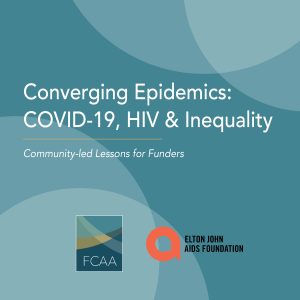The challenges presented by Covid-19 are not new to people living with, or at risk of HIV. Lesbian, gay, bisexual, transgender and queer (LGBTQ) and Black, Indigenous and people of Colour (BIPOC) communities in the United States—as well as key populations globally[1] — have been disproportionately affected by these same structural and systemic issues for decades. The pandemic didn’t create these inequalities and vulnerabilities, it has only brought them further into focus.
 A new report commissioned by Funders Concerned About AIDS and the Elton John AIDS Foundation provides an in-depth assessment of this challenge. Though our research began as a way to understand and mitigate the impact of Covid-19 on people impacted by HIV, it quickly became clear that we needed to broaden our lens to look at the crisis in a more intersectional way. We analysed available data and sought input from funders, community-based organisations (CBOs), and activists about their experience responding to Covid-19. The report’s takeaway is clear and urgent: funders and governments must listen to communities and work collaboratively with them—and with each other—to combat the converging epidemics of Covid-19, HIV, and systemic inequality.
A new report commissioned by Funders Concerned About AIDS and the Elton John AIDS Foundation provides an in-depth assessment of this challenge. Though our research began as a way to understand and mitigate the impact of Covid-19 on people impacted by HIV, it quickly became clear that we needed to broaden our lens to look at the crisis in a more intersectional way. We analysed available data and sought input from funders, community-based organisations (CBOs), and activists about their experience responding to Covid-19. The report’s takeaway is clear and urgent: funders and governments must listen to communities and work collaboratively with them—and with each other—to combat the converging epidemics of Covid-19, HIV, and systemic inequality.
Confusion, funding gaps & unmet needs
During the first 12 months of Covid-19, many groups which have largely been excluded from governmental humanitarian responses—for example, those who are criminalised or face stigma and discrimination—struggled first and foremost with basic survival needs such as food, shelter, and cash. Although unable to address the entirety of the need, private funders tried to at least partially fill those gaps through emergency grantmaking. But these efforts were not enough to meet the enormity of the moment.
Both governments and philanthropic entities seemed to have minimal communication, particularly in the U.S. context. As a result, while funding overlapped in some areas other important areas were greatly under-resourced. This resulted in disruptions in access to essential health services—including harm reduction, sexual and reproductive healthcare, and HIV prevention, testing, and treatment programs—the long-term impacts of which are still unknown. In addition, critical needs related to safety and security, immigration, detention protection, supports for economic relocation for survival, and general advocacy were lost in the crisis response.
Our research revealed a number of other issues related to the overlapping challenges of Covid-19, HIV, and systemic inequality:
- The challenge to survive infection, illness, and death—combined with the day-to-day impact of Covid-19—compounded mental health challenges for key populations; however, mental health services have long been lacking and continued to remain out of reach today.
- The global medical supply chain has been affected, with reports of severe disruptions to HIV testing, monitoring, sexual and reproductive healthcare, and harm reduction services.
- Affordable, timely access to technology wasn’t always possible, particularly in the global context where many didn’t have access to devices or internet. As services transitioned to digital platforms, infrastructure and training costs weren’t sufficiently supported.
- Gender-based violence and human rights infringement increased; Covid-19 exacerbated stigma, discrimination, harassment, and violence experienced by marginalised and criminalised populations.
- As resources shift to address Covid-19, there is concern that already plateauing resources for HIV/AIDS may be further—and permanently—diminished. In some communities, services have been diminished and prevention isn’t being funded, significantly increasing the risk for future HIV infections.
Funders’ response
Philanthropy moved quickly to respond to the pandemic. Many HIV-informed funders initiated rapid-response mechanisms, increased funding flexibility, and reprogrammed grants at the onset of the crisis. Intermediary funders, in particular, acted creatively to get needed resources —including cash support—to communities of colour and key populations.
However, the impact of these efforts wasn’t always felt by grantees. Flexibility often meant simply moving activities to online platforms or only changing activities that were directly tied to donors’ existing program strategies. Many CBOs struggled to meet burdensome administrative requirements, while working around the clock to serve their constituents and deal with the pandemic’s impact on their own lives.
These gaps were most acute at the intersections of COVID and gender and racial justice. Though donors worked quickly to disburse funds, as the pandemic stretched on, they failed to take stock, gather feedback, and coordinate in a more systematic way. Efforts to transform unequal and discriminatory systems, structures, and laws remain chronically underfunded. HIV and other donor communities—such as those focused on racial and gender justice, women’s rights, LGBTQ rights, worker’s rights, and youth rights—need to coordinate to achieve the best outcomes.
The research also suggests that HIV donors, networks, and grantees had limited ties to the humanitarian world pre-Covid. Greater collaboration would be beneficial to help ensure marginalised populations are not left out of continued and future humanitarian responses.
Learning from community
A commonality to all of these challenges is lack of community involvement, which, in most donor, institutional, and governance structures, remains limited. This contributes to a disconnect between what is needed, what is funded, and how funds are mobilised.
Throughout our interviews, many CBOs said their highest priority was funding flexibility, but in some settings, the flexibility they needed was hard to come by. For criminalised communities, activities that run counter to national law, or those not supported by donors’ policies—such as housing for sex workers, clean needle programs, and other harm-reduction interventions—remained under-resourced or unfunded.
In the absence of flexibility, communities cared for themselves in innovative—and mostly unfunded—ways. The report offers many examples of bright spots of community resiliency, flexibility, and creativity, such as: crowd-sourcing, food hubs, data sharing, transportation support, medicine sharing and delivery circles, care groups, communal safe housing, bartering, and pooling of financial resources.
Funding practices must change
The pandemic laid bare the consequences of siloed philanthropy. It has also highlighted the imperative to accelerate intersectional, multi-level work, with particular attention to integrating the HIV and Covid-19 response with racial justice efforts in the U.S. Through the identification of best practices and input from communities, this report provides a path forward. While it is perhaps unlikely that any one funder will take on all of the recommendations, our analysis unearthed a range of recommendations. It calls for directing resources to:
- Engage and support communities with long-term core support, while centering anti-racism, promoting community engagement in decision-making, and streamlining administrative requirements;
- Guarantee health, including mental health, healing justice, technology equity, and health services for marginalised groups;
- Prioritise human rights by funding advocacy, increasing awareness, and advocating for policies that advance racial and gender justice; and,
- Deliver social protection by increasing funding flexibility, sustaining community-led groups, and transferring cash for basic needs.
While the information contained in this report is new, the message is not. The recommendations reflect what communities have long advocated for. A number of funders have similarly expressed support for taking these steps. However, to date, the approaches have not been practiced or appropriately resourced to meet the need and address a rapidly shifting environment.
Structural inequality, stigma, and criminalisation existed long before Covid-19. If we don’t act now, they will to continue to stymie global health efforts. Funders not only have an opportunity but a mandate to create authentic, sustainable change.
The report is available on the FCAA website.
John Barnes is Executive Director at Funders Concerned about AIDS
Kali Lindsey is Portfolio Lead for US and Global LGBT Programs, Elton John AIDS Foundation







Comments (0)